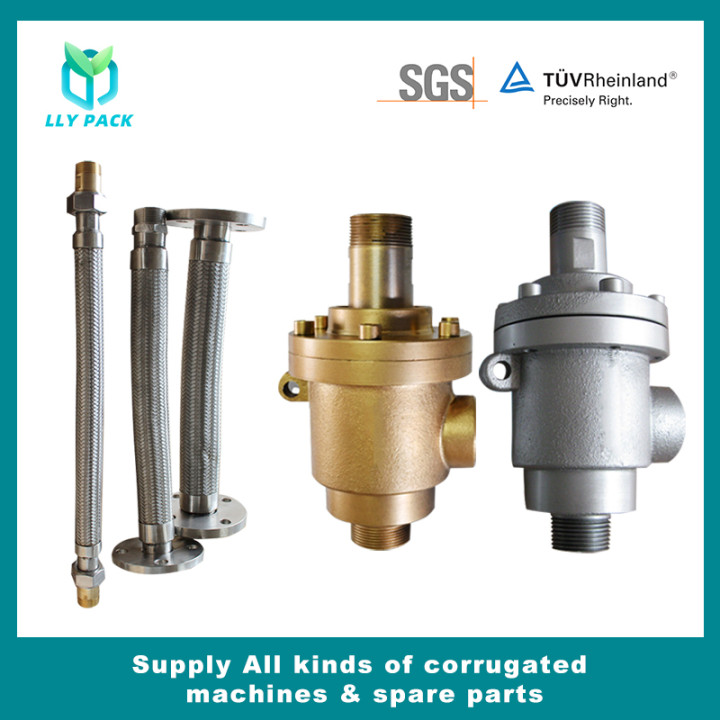Corrugated board adhesive strength depends mainly on the quality of the adhesive and corrugated board production line sizing quality.
Adhesive quality
The quality of the adhesive depends mainly on the strength of the adhesive manufacturing process and the quality of the raw materials used. The main raw material used for the binder is starch, which generally uses cornstarch above industrial grade one. If starches with lower grades are used, due to their poor processing precision, impurities such as proteins and fats will be consumed, more caustic soda will be consumed, the binder will be unstable, the bonded corrugated cardboard will absorb moisture easily, and the adhesive It is easy to produce gels with larger starch granules and impurities as the core, which deteriorates the fluidity.
Solid content, initial viscosity, viscosity, gelatinization temperature, etc., are important indicators for measuring adhesive quality:
1. Solid content
The solid content of the adhesive should be determined according to the equipment accuracy, operating speed, and the actual condition of the base paper. Once the high-speed wide corrugated board production line reaches a speed of 200 m/min or more, the solid content of the adhesive must be high. Water and starch are required. The ratio is usually between 2.5:1-3:1. The high solid content of the binder, the relative reduction of moisture, the smaller amount of glue can guarantee the adhesion of corrugated board; and the change of the moisture in the corrugated board processing process is small, which can reduce the warpage of the corrugated board. If the precision of the enterprise equipment is low, the speed is slow, the base paper is permeable, and the solid content of the adhesive is lower, otherwise the quality problems such as degumming of the corrugated cardboard, crystallization of the paste line, and popping may occur.
2. Early tack
The initial tack is the key to ensure the adhesion of corrugated cardboard and increase the speed. In the production of corrugated board, the preheating area of the base paper is increased, or the cross-linking agent is added during the production of the adhesive, and borax is added to the main body and the carrier tank to increase the solid content of the binder, and the adhesive can be coated. After a short period of time began to produce adhesion, and its cohesive force can damage the paper fiber.
3. Viscosity
The lower the adhesive viscosity, the better the flowability. The fluidity of the adhesive determines the permeability of the adhesive, the uniformity of the sizing, and the amount of glue, directly affecting the speed of the vehicle, the bonding of the paperboard, the flatness and strength of the paperboard. In addition, the higher the proportion of starch in the binder, the poorer the flowability; the high solid content binder can also maintain a very low viscosity by adjusting the formulation process. Under normal circumstances, when the adhesive is recycled, its viscosity will decrease once it passes through the circulation pump. At this point, it should be blended with the newly produced adhesive.
4. Gelatinization temperature
The gelatinization temperature refers to the initial temperature required to convert the starch binder into a paste. The gelatinization temperature of the binder is a problem in solving the gelatinization temperature of the binder, which is a key factor in maintaining high-speed production, except that the caustic soda is adjusted. Dosage and heating methods, the appropriate addition of some additives can also have the same effect. The gelatinization temperature should not be too low, otherwise it will cause the adhesive to gelatinize during the cycle and affect the fluidity of the adhesive. The gelatinization temperature of the adhesive should be adjusted according to seasonal changes. In the winter, the gelatinization temperature can be adjusted to 55-60°C, and in the summer, the gelatinization temperature can be adjusted to 61°C-66.
Corrugated board production line sizing quality
In Europe and America, the most important one for checking the quality of corrugated boxes is the inspection of the width of the viscose glue line. The standard sizing is precisely positioned, the adhesive is applied evenly and smoothly throughout the peak, the paste lines are clearly outlined, and no adhesive is ejected laterally from the corrugations, leaving no trailing glue marks. [next]
The bad sizing is mainly related to the equipment state, adhesive quality, and quality of the base paper of the corrugated cardboard production line. The common quality problems caused by poor sizing mainly manifest in the following aspects:
1. Dropping glue
There are dirt on the rubber roller, such as paper scraps, agglomerates of starch and other foreign materials, etc., or the foreign material on the roll surface is blocked, causing the gluing roller to fail to squeegee, only a small amount of adhesive can be transferred, and it can be easily wiped. Falling, glue will appear at the peak of the glue on the lack of intermittent gluing phenomenon. The surface of such a corrugated paperboard will show signs of layering of the paper and the core paper, and the compressive strength, side pressure strength and adhesive strength of the carton will be reduced.
When the gap between the upper and lower corrugating rolls is too wide, the upper roll cannot contact the lower corrugating roll and there is not enough adhesive on the corrugation peak.
2. Adhesive lateral ejection phenomenon
Adhesive viscosity is too high; when it is too low or the content of borax is too high, lateral spraying of the adhesive is likely to occur when the production line is running at a high speed, which may cause warpage of the cardboard or softness of the cardboard, adhesion of the carton, side pressure And the compressive strength will be reduced.
3. Guide paw marks or vacuum marks
Traces of guide jaws or vacuum marks appear on the sizing part. The cartons made of such corrugated cardboard often break during use, and the side pressure strength of the corrugated cardboard and the compressive strength of the carton are greatly reduced. Corrugated cardboard produced by a single-faced machine with guide jaws often exhibits leader marks (a clear, adhesive-free space) at the sizing section, usually due to bending, wear, misalignment or adjustment of the guide jaws. Large; the adhesive accumulates on the baffle and condenses into a mass, and these hardened starches will rub off the adhesive on the roller and form a blank trace of the leader. In addition, the high moisture content of the corrugated paper and the abrasion of the wide adhesive on the glue roller caused by the wear on the rubber roller or by the foreign material will cause this quality problem. Non-guided single-sided machines often have vacuum marks on the gluing section. This is mainly due to too much vacuum in the corrugating roll. The vacuum will cause the corrugated base paper to be excessively affixed to the corrugating roll, causing the core paper to dent, and the rubber roll cannot The adhesive is applied to the ridges of the recessed core paper.
4. Severely blurred intermittent sizing
This phenomenon occurs before the glue roller, mainly due to the distance between the guide jaw baffle and the corrugating roller is too large, the guide jaw baffle is damaged or worn, the moisture content of the corrugated base paper is high, the pressure on the pressure roller is not uniform, the corrugating roller There is dirt, the brake on the core paper paper is slack, the pressure on the corrugating roller is uneven or the pressure is too low, there is no vacuum on the corrugating roller or there is no vacuum temporarily.
5. Irregular sizing shapes
The irregular sizing shape is mainly caused by the unevenness of the corrugation caused by inaccurate position when the guide jaw and the core paper pass between the various rollers. The quality of the core paper, dirt on the corrugating roller, rough surface wear, and guide claws Wear, damage, bending, foreign matter on the guide jaws, lack of guide vacuum pressure or vacuum hole plugging, improper pressure on the pressure roller, too much or uneven brake tension on the core paper, etc.
6. Insufficient or no adhesive on adhesive
Adhesive viscosity is too low, jamming of the rubber roller net, and gap between the rubber roller and the rubber roller are too small, which can lead to insufficient sizing. The gap between the rubber roller and the corrugating roller is too large, the steam condensate drips on the gluing roller, the adhesive liquid level in the glue amount is too low, the contact between the lower corrugating roller and the pressure roller is bad, and the height and position of the corrugating roller are not All will lead to no adhesion phenomenon.
7. Adhesive oversizing
Adhesive sizing is usually due to excessive gap between the squeegee and squeegee, or excessive viscosity of the adhesive. Not only does the adhesive waste, but it also results in problems with slatted cardboard or warpage of the board, and in severe cases, significant wrinkling occurs.
8. Effect of corrugating roller on sizing
Corrugated rollers have depressions, dirt on the surface, damaged or worn corrugated rods, non-uniform corrugating roller clamping pressure, corrugating roller corrugation is not parallel and will affect the corrugated forming, directly leading to poor sizing.
9. Poor sizing at the slit edge
Corrugated cardboard longitudinally edged paper and corrugating medium are not bonded, and loose paper occurs. The main reason is that the slitting tool is not sharp, the slitting machine is running at a high speed, the slitting knife overlaps too much, and the slitting edge has a guide. Paw or vacuum marks, non-uniform moisture content at the edge of the tissue, uneven wear on the corrugating roll due to the difference in the paper web, and adhesive agglomeration on the pressure roller or lower corrugating roller.










